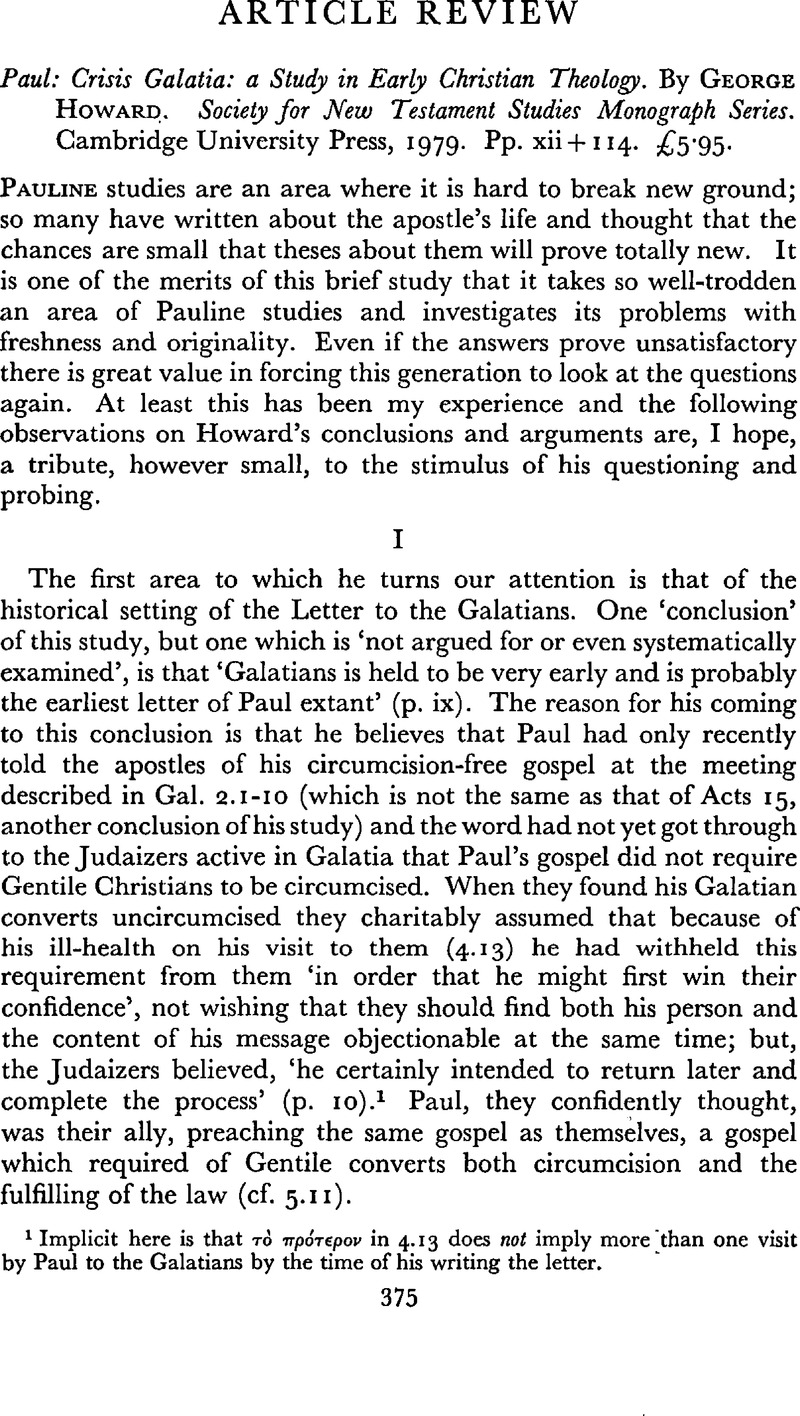No CrossRef data available.
Article contents
Article Review
Published online by Cambridge University Press: 02 February 2009
Abstract

- Type
- Article Review
- Information
- Copyright
- Copyright © Scottish Journal of Theology Ltd 1980
References
page 375 note 1 Implicit here is that τὸ πρότερον in 4.13 does not imply more than one visit by Paul to the Galatians by the time of his writing the letter.
page 376 note 1 Cf. Georgi, D., Die Geschichte der Kollekte des Paulus für Jerusalem (ThF xxxviii, Hamburg-Bergstedt, 1965), p. 21Google Scholar (Howard in fact makes no express use of this work).
page 377 note 1 Cf. Schmithals, W., Paul and James (SBTh xlvi, London, 1965), pp. 19–30Google Scholar; cf. here too Suhl, A., Paulus und seine Briefe; ein Beitrag zur paulinischen Chronologic (SNT xi, Gütersloh, 1975), pp. 30–35.Google Scholar
page 377 note 2 Even if ‘Eλληιστὰς is kept here as the lectio difficilior it is clear from the context that Gentiles rather than Jews are meant; in that case Acts' usage here is different from that of chs. 6 and 9 and this difference is perhaps best accounted for by the use of sources with different usages.
page 378 note 1 Assuming that the Western reading in Gal. 2.5 (deleting οὐδέ) is incorrect; certainly it would be a very odd—and damaging—concession of Paul's to say that he had allowed the Gentile Titus to be circumcised ![]() . If the Western reading is correct then they could also appeal to this case.
. If the Western reading is correct then they could also appeal to this case.
page 379 note 1 ‘Paul, James and the Apostolic Decree’, NTS xxiii (1976/1977), pp. 428–444.Google Scholar
page 381 note 1 Howard cites 8 (9) examples in the Pauline corpus: in Rom. 3.22 it would mean that the πίστις χριστο![]() was referring to something different but not unrelated to the πάντες οἱ πιστεύοντες (cf. also Gal. 3.22); in 3.26 ὁ ἐκ πίστεως Ἰ ησο
was referring to something different but not unrelated to the πάντες οἱ πιστεύοντες (cf. also Gal. 3.22); in 3.26 ὁ ἐκ πίστεως Ἰ ησο![]() is anyway an oddly compressed phrase and perhaps even more so on Howard's interpretation (in Gal. 3.7 οί ἐκ πίστεως surely must mean ‘those who have faith’ or ‘those who are justified on the basis of (their) faith’ as Abraham was?); in Gal 2.16 (2x), 20 (
is anyway an oddly compressed phrase and perhaps even more so on Howard's interpretation (in Gal. 3.7 οί ἐκ πίστεως surely must mean ‘those who have faith’ or ‘those who are justified on the basis of (their) faith’ as Abraham was?); in Gal 2.16 (2x), 20 (![]() ); Eph 3.12; Phil. 3.9 it is hard to decide which interpretation makes the better sense; in the v.l. in Gal. 3.26 (P46) the subjective genitive would perhaps give a slightly better sense, but
); Eph 3.12; Phil. 3.9 it is hard to decide which interpretation makes the better sense; in the v.l. in Gal. 3.26 (P46) the subjective genitive would perhaps give a slightly better sense, but ![]() would give the required representative sense just as well.
would give the required representative sense just as well.
page 381 note 2 Cf. Bultmann, R., Theology of the New Testament I (London, 1952), pp. 314–317.Google Scholar
page 382 note 1 But cf. NEB, ‘Jesus, on whom faith depends from start to finish’; in support of the JB rendering cf. Delling, G. in TDNT I, p. 488.Google Scholar
page 382 note 2 It is by no means impossible that Paul could make use of this ambiguity, or rather spectrum of meaning, just as he may well make use of the considerable range of meaning of δικαιοσὺνη θεο![]() .
.
page 382 note 3 Sanders, E. P., Paul and Palestinian Judaism (London, 1977), p. 552.Google Scholar
page 383 note 1 Note the variations between first and second person plural in v. 3ff.; Paul wishes to put former Gentiles and former Jews who have become Christians on the same level.
page 383 note 2 If the στοιΧ![]() α do not refer to astral deities or ‘elemental spirits’ (cf. G. Delling, , TDMT VII, pp. 681–685Google Scholar) then this word may carry an allusion to the common Jewish polemic against idols as human artefacts made out of inanimate materials; however, its application is probably wider than this, including the tendency to identify the elements with various deities (cf. G. Delling, ibid., pp. 673–5, 683–5).
α do not refer to astral deities or ‘elemental spirits’ (cf. G. Delling, , TDMT VII, pp. 681–685Google Scholar) then this word may carry an allusion to the common Jewish polemic against idols as human artefacts made out of inanimate materials; however, its application is probably wider than this, including the tendency to identify the elements with various deities (cf. G. Delling, ibid., pp. 673–5, 683–5).
page 384 note 1 Cf. the analysis of the Roman church in Schmithals, W., Der Römerbrief als historisches Problem (Gütersloh, 1975), especially pp. 63–91Google Scholar; also Wedderburn, A. J. M., ‘The Purpose and Occasion of Romans Again’, ET xc (1979), pp. 137–141.Google Scholar
page 385 note 1 Das Gesetz bei Paulus: ein Beitrag zum Werden der paulinischen Theologie (FRLANT cxix, Göttingen, 1978), pp. 47f.Google Scholar




